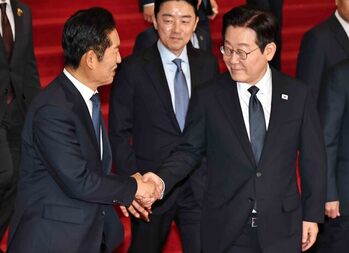-
서울시청앞 광장에서 열린 북한 정치범수용소를 규탄하는 보기드문 집회가 민주당 정치인들과 노동단체의 반정부 시위로 중단되었다고 미국의 유력일간지 월스트리트 저널이 보도했다.
신문은, 한국에서 북한의 인권유린문제는 크게 호응을 얻지 못하는 반면, 반정부 시위는 대규모로 열린다면서 지난 토요일밤(20일) 같은 장소에서 열린 두 행사는 한국정치의 핵심을 상징하는 것이었다고 말했다.
월스트리트 저널은 20일밤 대학생 단체들의 집회와 민노총의 시위 방해행위에 대하여 비교적 상세하게 밝히면서 특히 북한을 고발하는 영화가 상영되는 중에 누군가가 전선을 절단한 사실을 보도했다.
북한인권행사 주관자인 한동대 로스쿨 학생 인지연씨는 "이것이 한국 사회의 현실입니다. 우리 행사는 제대로 보호받지 못했습니다."면서 "민노총 시위대가 불법 무대를 일방적으로 설치했고, 북한고발 영화 상영도중 케이블까지 절단할 줄은 상상도 못했다"고 말했다고 보도했다.
또한 월스트리트 저널은 서울광장 행사에 참석한 오길남 박사와 인터뷰, "북한 수용소에서 고통받는 가족들이 살아 있어서 꼭 만나기를 바란다"는 말도 함께 보도했다.
월스트리트 저널이 20일 북한인권 행사를 보도한데 이어 '집회 방해'사건까지 보도한 것은 이례적이다.
다음은 월스트리트 저널의 두번째 보도 내용이다.
By EVAN RAMSTAD
SEOUL—A rare public demonstration by South Koreans against North Korea's prison camps was marred near its end by a larger group of Democratic Party politicians, progressive civic groups and labor unions that took over the same space, a plaza in front of Seoul's city hall, to complain about the South's government.The two events on Saturday night underlined a fundamental dynamic in South Korean politics, which is that events and abuses in authoritarian North Korea inspire little protest while relatively modest grievances in the democratic South can draw large crowds.
South Korean Confederation of Trade Unions protesters shout slogans during a rally against the government's labor policy in Seoul, South Korea, on Saturday.
.The chief cause on Saturday night for the civic groups and labor unions was to defeat a municipal referendum in Seoul later this week that's designed to overturn an effort by Democratic Party politicians to provide free school lunches. Several thousand people attended the protest, included hundreds who arrived in buses from other cities."That's the reality of South Korean society," said Ihn Ji-yeon, a law-school student and organizer of the North Korea-related demonstration attended by just a few hundred people. "Our event could not be entirely protected."
North Korean protests tend to be so small in the South that organizers rarely attempt to secure a space as large as the plaza in front of Seoul's city hall, which can accommodate about 10,000 people. After reserving the space, the protest organizers arrived Saturday afternoon to find a second stage was being set up by the Democratic Party and other activists.
Hundreds of police kept the two groups separated and prevented the larger group from taking over the plaza until about 10 p.m. When it did, someone cut the power to the audio and video equipment being used for the North Korea-related protest. Ms. Ihn said she and other organizers weren't able to figure out how that happened.
The organizers of the North Korea protest were spurred by residents of a city called Tongyeong, on South Korea's southern coast, who have been raising money and buying advertisements to press for the release of a Tongyeong woman from a North Korean prison. The woman, Shin Sook-ja, grew up in the city in the 1960s and 1970s, and is believed to have been sent to a North Korean prison camp since 1985. It's unknown if she is still alive.
Ms. Shin is the wife of a South Korean economist named Oh Kil-nam. The couple, with their two daughters, was living in Germany in the early 1980s when Ms. Shin became ill and a North Korean acquaintance told Mr. Oh they could get free medical care in the North. After Mr. Oh accepted the invitation, the couple and their two daughters were taken to an indoctrination camp in the North.
The North Korean government later sent Mr. Oh back to Europe to recruit more South Koreans. But Ms. Shin and the couple's two daughters weren't allowed to leave with him. Mr. Oh wrote a book about his ordeal in the early 1990s but has lived a quiet life in Seoul since then, occasionally giving interviews about his situation.
In an interview at Saturday's protest, Mr. Oh, who is now 69 years old, said he was surprised and touched by the renewed attention to his family's plight. "I desperately hope they are alive," he said. "I believe they are even though they are in a terrible place. My hope is to meet them again."
Amnesty International and other human-rights groups estimate the North's prison camps house 200,000 people, most of who aren't criminals but people perceived to pose a political threat to the Kim Jong Il regime. At least 500 South Koreans are believed to be detained in the camps.
Write to Evan Ramstad at evan.ramstad@wsj.com
美 언론, 민노총의 대학생 집회방해사건 상세 보도
- 인보길 기자
입력 2011-08-23 14:21수정 2011-08-23 15:23
공유하기
기사 공유하기
인보길 기자







